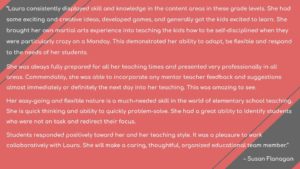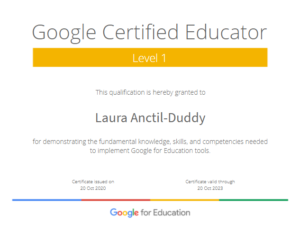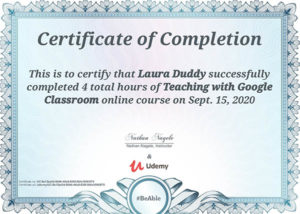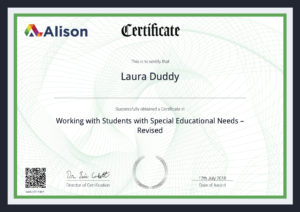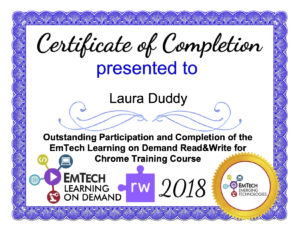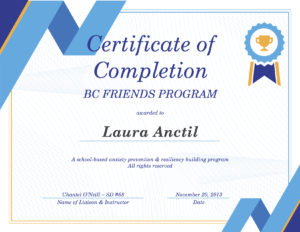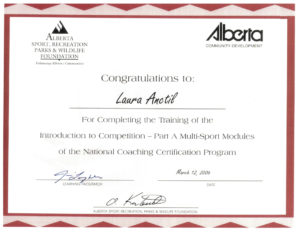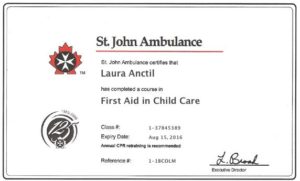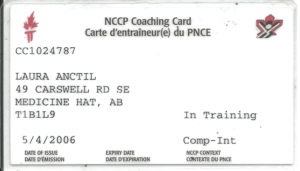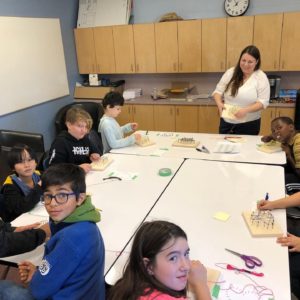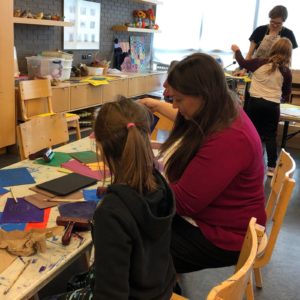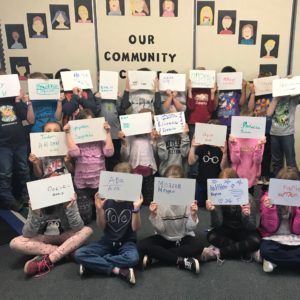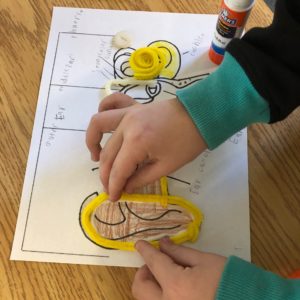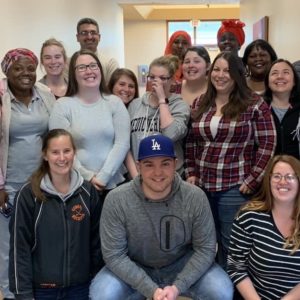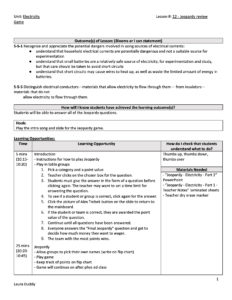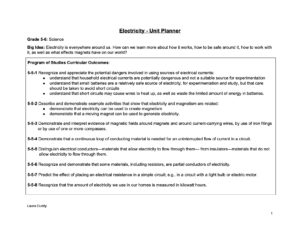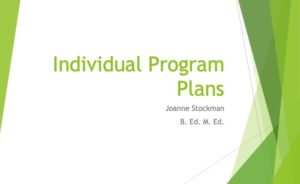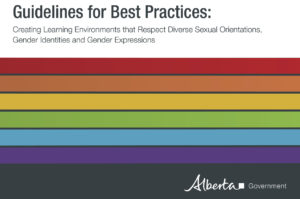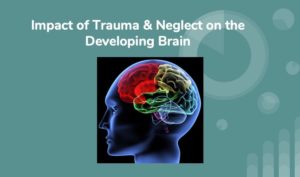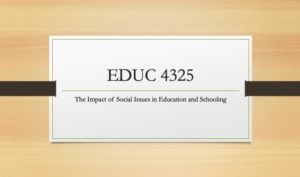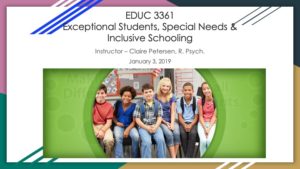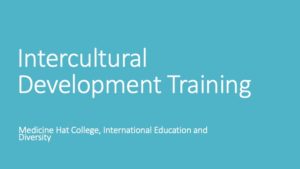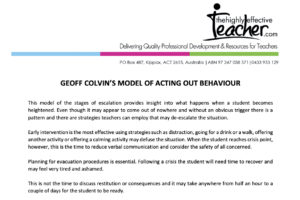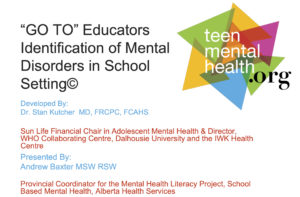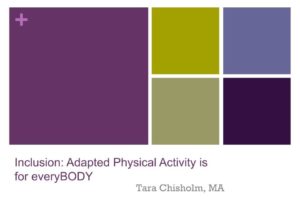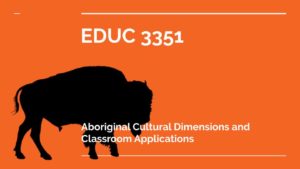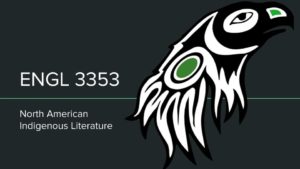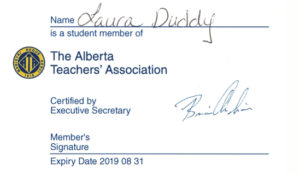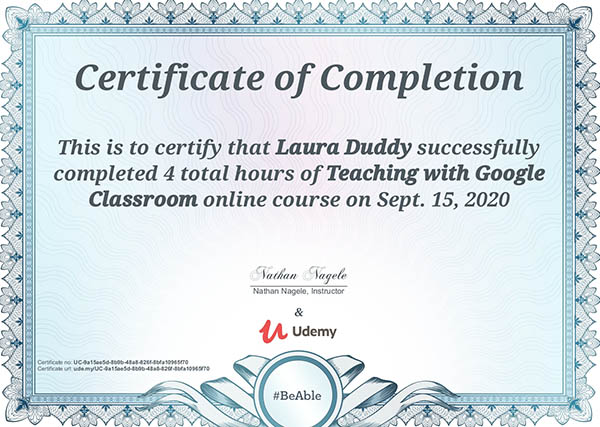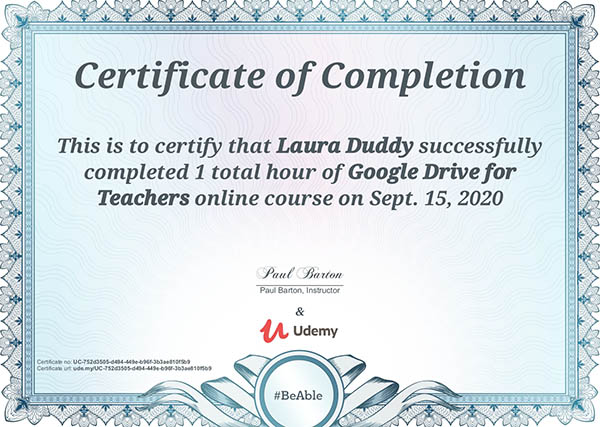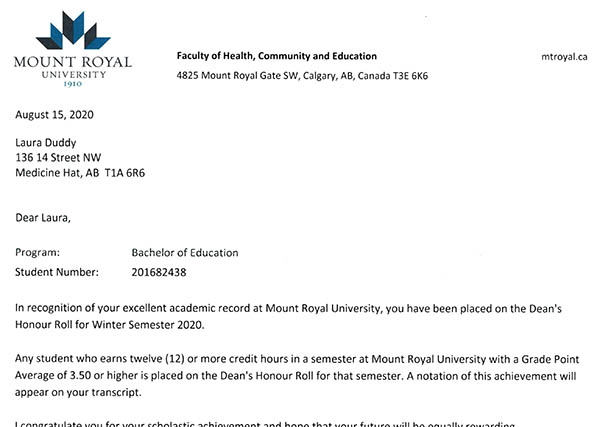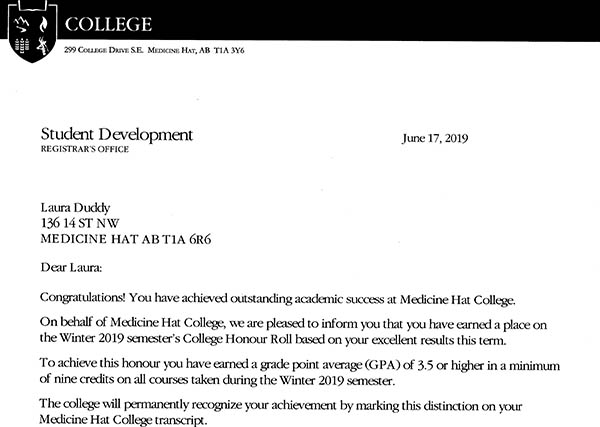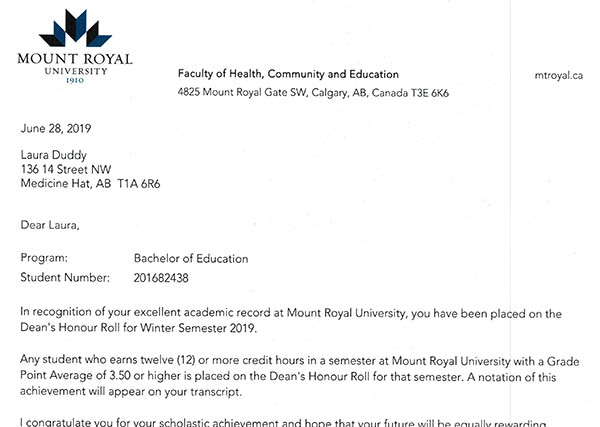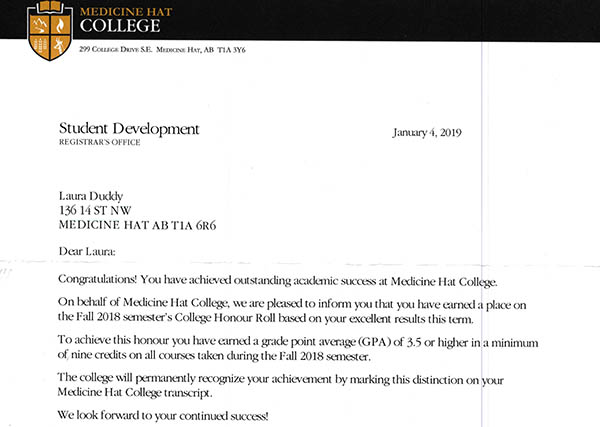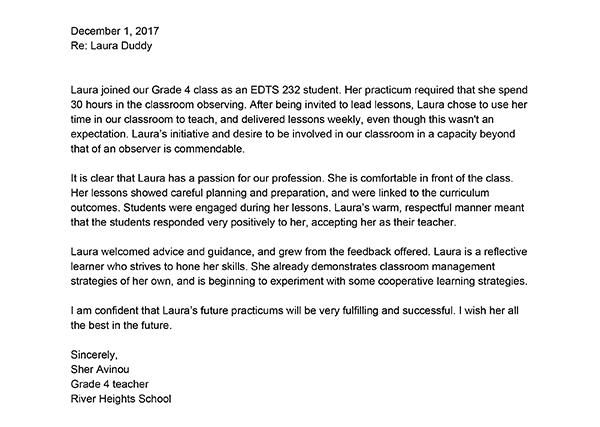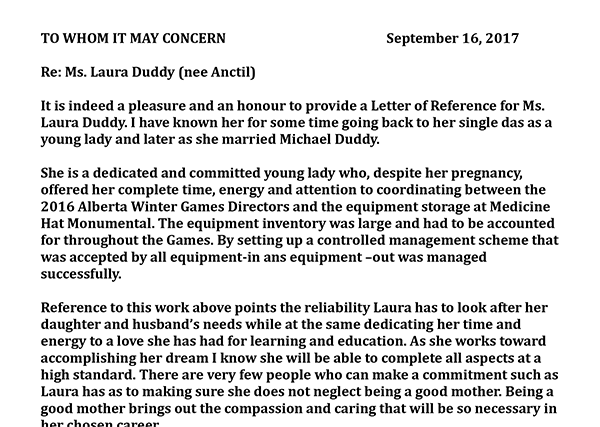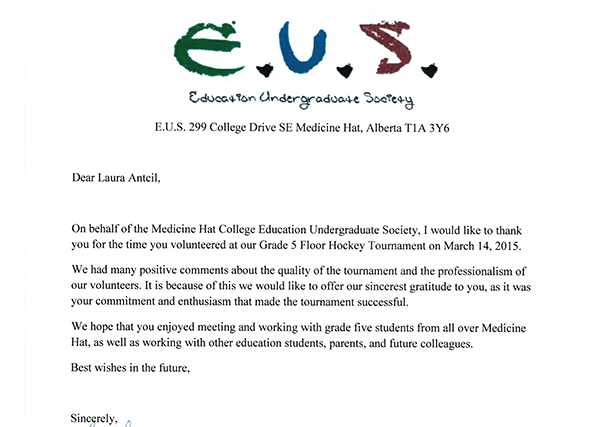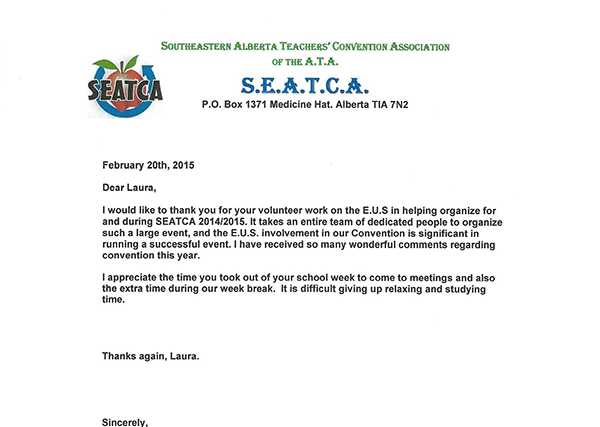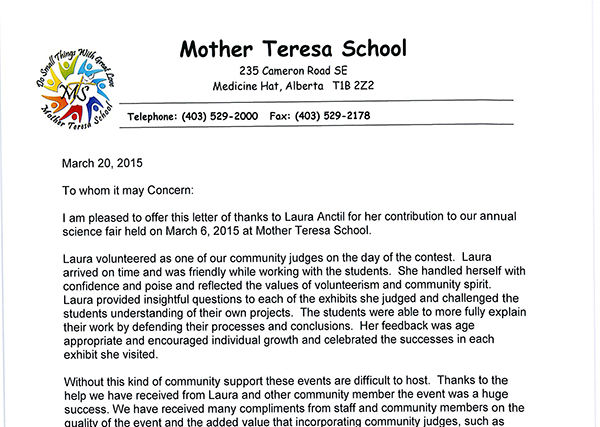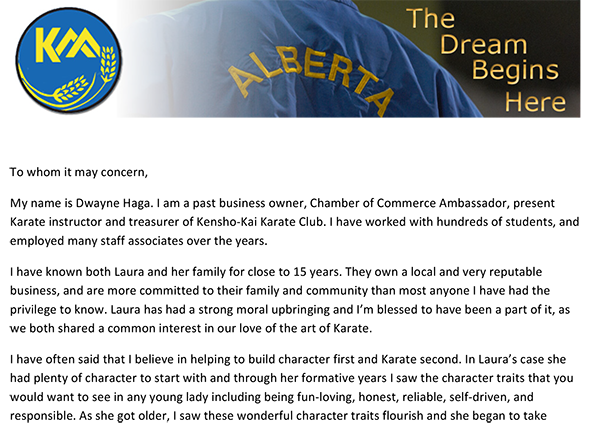About me
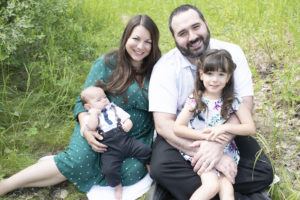 Laura Anctil
Laura Anctil
Teacher, Mother, and Experience-Seeker
I am an outgoing, energetic, passionate person. Together with my husband and our two children, we live in Medicine Hat. Although we have also lived in Nanaimo, BC. Living in two different provinces and working with children in both has allowed me a have a broader view of different types and styles of child care. This experience is a great asset to my teaching career and helped influence my teaching philosophy.
I was born in Medicine Hat to two loving parents and I am the oldest of three girls. We grew up as a close knit family and spent a lot of time with the extended family as well. With the exception of one aunt, my entire extended family all lived within a 3-hour radius of my hometown. This lead to a great amount of time shared with them. Traditions developed like Sunday Family Supper every week and yearly family reunions. My summers were spent with my sisters as we travelled between family members. Usually, our summers would start with a week out at Camp McCoy in Elkwater, followed by joining our grandparents at their home in a small town in Saskatchewan. Later we would go with them to our aunt and uncle’s ranch. There we would ride horses, learned to rope, and played with the farm animals. After that, our other grandparents would pick us up and take us to the cabin at the family lake. The small summer community that the cabin was situated on was composed of mostly more families. In the evenings, the adults would take turns hosting dinner and a bonfire. Spending this much time with family has instilled a strong core within me and has given me a great appreciation for the family unit. As well, spending so much time with my sisters has made them my best friends. For all of our weddings, we were each other’s maids of honour.
Another thing my family did was travel together. Travelling with my family was something we did frequently. I have been blessed with the number of vacations I have taken in my life. I have travelled throughout the majority of Canada, from BC to Quebec as well as the Northwest Territories. As well, I have travelled extensively in the United States. Of the 50 states, I have been to all but 7 of them. My goal is to travel to the remaining provinces, territories, and states before I turn 40. I have also had the opportunity to go on five cruises which gave me access to eight other countries besides Canada and the USA. In addition, I have travelled to Europe. There I went to France, Germany, Italy and the Vatican City. I enjoy travelling and get out of town at every possibility. Whether it’s a grand adventure or just to experience the other unique places in my area. Learning about and getting to experience new countries is a joy of mine. I love being submerged in different cultures and will always have the travel bug.
Getting to spend a lot of time on a ranch, I learnt to care for and appreciate a wide range of animals. Growing up, we also had a bunch of animals at home. Dogs, a cat, rabbits, birds, and guinea pigs. On my many adventures around the world, I would always insist on visiting the local zoo. As well, I enjoy getting to interact with animals. I have swum with dolphins, stingrays, tropical fish, and even a barracuda. At zoos, I visit the touch tanks or petting zoos. I love all types of animals, big or small, furry or scaled, land based or water creatures. My passion for all creatures has always guided me in my adventures. And has carried over into my home life where I have a house full of critters.
While I love family, travelling, and animals my greatest passion is martial arts. I joined karate when I was 8 years old and instantly fell in love. I quickly moved up the ranks, gaining belts faster than most of my peers. By the time I was 16 I was ready to grade for my black belt. Unfortunately in my karate style, you must be 18 to grade for your black belt. They feel that you are not mature enough to handle the responsibility of the belt level. However, at 16 I took over my karate club when my Sensei left. Due to this and my abilities, I was able to petition for grading early. The O’Sensei of my style had to grade me and I achieved my junior black belt. I succeeded in my grading and became the Sensei of my club. When I was 18 I took my black belt test and got the full belt. At 20, I took the grading to achieve my second-degree black belt. I left my club in 2009 when I moved to Vancouver Island. But I returned and joined a class whenever I was back home.
“It is the supreme art of the teacher to awaken joy in creative expression and knowledge”
Albert Einstein
Albert Einstein
Teaching Philosophy
Teachers must be leaders, in every sense of the word. All actions and words must be conducive to inspiring students. Children tend to do as they see, so I believe how I act will influence them as much as what I say will. Being energetic about what I am teaching is crucial. I can not expect students to be excited about a subject and get involved, unless I lead in the enthusiasm. Remaining calm in trying situations is another strength I believe teachers must possess. What is said and how it’s said can greatly impact a student and a classroom. Confidence in my speech and positive amounts of assertiveness aid to being a better teacher. This confidence comes from knowledge on the subjects being taught, which stems from always being prepared. Keeping myself organized, up to date on latest information, and advance planning are essential to being a well prepared teacher.
It is my belief that working with children means that they must be nurtured and cared for. They should feel like they are in a safe place when they come into my classroom. I want them to succeed as students and as human beings. I want my students to be able to approach me with questions about their school work, problems with friends or other students, and if something outside of school is bothering them. No matter what it is, good or bad, I will work towards being a teacher that students want to tell things to.
I feel that it is as much about teaching as it is about learning. Teachers must constantly be expanding their knowledge. Learning facts beyond what I must teach will assist me in being able to present the topic with great confidence. As well, it will provide me with further information, should students ask questions above the required assignment. Furthermore, I believe that it is imperative teachers remain current on the latest teaching techniques, what is the leading-edge technology for the classroom, and any changes to the curriculum.
Students need to be in a place that has a secure, caring, energetic, and stimulating atmosphere. Their classroom is an area where they should feel safe and be able to open up. With their basic human needs met, the students will be easily adaptable to situations that may present themselves, feel comfortable in learning, as well as feel confident in achieving their goals. I believe that this environment will also encourage their inquisitive nature. This will further allow them to develop themselves and their education. Learning must occur, but should not stop at the curriculum. As the teacher, I feel that it is my duty to develop the classroom with this philosophy. It is my responsibility to provide a place where children are happy and want to come back tomorrow.
"Tell me and I forget. Teach me and I remember. Involve me and I learn.”
Benjamin Franklin
Teaching Quality Standard
** Click on the images to learn more **
Fostering Effective Relationships
1. A teacher builds positive and productive relationships with students, parents/guardians, peers and others in the school and local community to support student learning.
Engaging in Career-Long Learning
2. A teacher engages in career-long professional learning and ongoing critical reflection to improve teaching and learning.
Demonstrating a Professional Body of Knowledge
3. A teacher applies a current and comprehensive repertoire of effective planning, instruction, and assessment practices to meet the learning needs of every student.
Establishing Inclusive Learning Environments
4. A teacher establishes, promotes and sustains inclusive learning environments where diversity is embraced and every student is welcomed, cared for, respected and safe.
Applying Foundational Knowledge about First Nations, Métis and Inuit
5. A teacher develops and applies foundational knowledge about First Nations, Métis and Inuit for the benefit of all students.
My resume
Related Work Experience
Babysitting/Nanny
from 1999 to 2009
Babysitting/Nanny
Receiving my babysitting certificate at age 12, I began watching children after school and on weekends. I continued on with my babysitting career into my early twenties. When I turned 15, I became a full time nanny for a family with four children. Working daily with this family for several years, taking care of the children until the youngest began school. During my nearly a decade, I babysat and nannied for roughly 50 children ranging from newborns to thirteen years old.
Boys and Girls Club of Central Vancouver Island
From 2011 to 2014
Boys and Girls Club of Central Vancouver Island
In the beginning, I worked as a leader and caregiver to school children enrolled into the program. Soon, I was sent to another club within the same organization for the summer. My duties then expanded to being in charge of the summer programs. I planned the entire summer for two separate groups. I created them so each day included a theme day with a coordinating activity or craft, snack, physical exercise, and often an out-trip. Once the summer had concluded, I was asked to once again relocate to another club. This club was the most difficult club on Vancouver Island with the largest number of special needs children, “trouble” kids, foster children, and youngsters waiting to be tested. I was assigned to the kindergarten students. The classroom quickly began to change and be reoriented with my new structure. I reframed the class, set new ground rules, started a reward system, and developed a daily structure which included lesson plans.
Camp McCoy Youth Camp
From 2002 to 2004
Camp McCoy Counsellor
In my teenage years, during the summers, I worked as a camp counsellor. Starting out as a junior counsellor, I was a bunk leader. It wasn’t long before I worked my way up the ranks and became the Junior Director. Along with the Camp Director and the Youth Camp Chief, I planned the entire summer for the camp children. We planned to teach safety, different games to play, a variety of arts and crafts to do, physical activities everyone could take part in, chores for the kids, cooking plans that involved the camper's assistance in preparing, and daily schedules to keep it all organized.
Shining Stars
From 2010 to 2011
Shining Stars
After moving away from my hometown, I found work at an after school program within a school. Initially, I was a spare worker but due to my ability to connect with the troubled students, soon I was full time. This, however, did not last long since shortly after I had begun working there, I was recruited for a larger before and after school organization.
Southview Kiddie Campus Daycare
From 2008 to 2009
Southview Kiddie Campus Daycare
In 2008, I began working at a daycare in my neighbourhood. It was a large daycare with numerous rooms for different age groups. The youngest children were 6 months old and the oldest group was a couple of pre-kindergarten classes. My job within the daycare was to act as a swing shifter, or more commonly referred to as a substitute. I worked in whatever room needed an extra hand, had a staff member away, or if a group had an outing. This allowed me to move throughout the daycare and experience everything it had to offer. I worked with various instructors, was around a wide range of ages and abilities, and got to experience an endless amount of joy working with small children. I absorbed as much information as I could before I moved away from Medicine Hat and had to give up a job that was a wealth of knowledge.
Additional Work Experience
Additional Work Experience
Medicine Hat Monumental 1999 - Present, Medicine Hat Arena 2003 - 2008, Athletic Park Baseball Diamond 2004 - 2006, Staples Business Depot #113 2005 - 2008, London Drugs #60 2008 - 2009, The Lounge Radio Station 2008 - 2009, Rogers Plus #186 2010 - 2011, Cobs Bread Bakery Nanaimo 2011 - 2013
Education experience
High School
from 2003 to 2005
McCoy High School
Attended McCoy High School in Medicine Hat for grades 10, 11 and 12. Graduated in 2005.
University
from 2006 to 2020
Medicine Hat College
Attended Medicine Hat College for general studies until moving to another province. I returned in 2015 after moving back to Medicine Hat although only took classes sporadically for a few years while raising my daughter. Did full time only after being accepted into the competitive third year of the Education program.
Volunteer experience
Young Entrepreneurs Program
Vancouver Island Exhibition
St. Thomas Aquinas Elementary School
St. Thomas Aquinas Elementary School
I have been lucky enough to have an aunt in the Medicine Hat school district who has allowed me to work closely with her for many years. Starting while I was still in high school, I would accompany her after school to mark tests, set up next day activities, decorate bulletin boards, and aid her in the execution of her lesson plans. Getting great hands on experience for the “behind the scenes” aspect of teaching, gave me a jump on understanding how a classroom operates. As well, I learnt the large amount of planning, time, and organization needed to make everything run like clockwork. She has been my inspiration and my mentor. Beyond aiding in the classroom, I was rapidly involved in many events and activities St. Thomas put on. Including, the yearly track and field, field trips to Police Point Interpretive Centre, field trips to Echo Dale, movie nights, Christmas concerts, and Penny Carnivals.
Salta Gymnastics Club
Salta Gymnastics Club
My youngest sister was a competitive gymnast and very active in Salta Gymnastics. To help her, our family began assisting Salta with their local competitions. I had been a score keeper, sold tickets, organized the door prizes, and managed the judges lounge. Once I turned 18, I also began volunteering as a worker for their fundraising bingos and casinos.
Nanaimo Daily News Give & Go
Nanaimo Daily News Give & Go
During the Christmas season, the Nanaimo Daily News held their annual Give & Go. An event where locals would drive through the parking lot of the Daily News and drop off donations; of food, money, clothing, toys; for the Salvation Army. My role for this event was wide-spread. For the prep-work before the Give & Go, I helped with collecting items for the give-away bags and then putting the bags together. During the Give & Go event, my fiancé and I were in charge of the music. We were responsible for securing the donation of the speakers and their rigs, setting it all up, creating the Christmas music playlist, playing music during the entirety of the affair, cleaning up the gear after, and returning it to the sponsors. After the Give & Go, we assisted in packing up the Salvation Army trucks.
Medicine Hat Regional Hospital
Medicine Hat Regional Hospital
In grade 6, I started working at the local hospital as a candy striper. My duties included assisting the elderly with eating, making and passing out coffee or tea, and running small errands for the nurses on the ward. Working as a candy striper at the hospital began as a volunteer assignment for my Confirmation. I was required to complete 50 hours of volunteer work, but I truly enjoyed this position and remained volunteering with them for just over two years.
Medicine Hat Food Bank
Medicine Hat College Musical
Medicine Hat Kinplex
Medicine Hat Kinplex
For a short period, I worked as a volunteer concession worker at the Kinplex in support of the Hockey Hounds tournaments. Duties were similar to the ones I held while working at the Arena; cashier, cook, and cleaning the concessions.
McCoy High School
McCoy High School
While attending McCoy High School, I was very active in the student council. My first role was as a school council member representing the Grade 10 class. The next year I became the student council sports representative; which had duties that included pep rally advisor and organizer, mascot manager, organize and run Red Days (McCoy Spirit Days). In my senior year, I became the student council president. This came with many responsibilities that were assigned to me. But above and beyond that, I took on several other obligations. Including bringing in guest speakers, organizing school wide events, and representing the sports teams. With all this, I still continued my role as the sports representative within the student council. Along with that, I was a scorekeeper for all volleyball and basketball games and tournaments that took place at McCoy. As well, I co-founded the McCoy school paper. In this endeavour, I was the co editor and the sports reported for the weekly paper. Furthermore, I was a school tour guide for new students both during the school year and on the “Welcome to Our School” nights.
Knights of Columbus #9502
Knights of Columbus #9502
The Knights are the world’s largest Catholic fraternal service organization. My father has been greatly involved with them for most of his adult life and is currently on the State board. His involvement has lead to my involvement. At a young age, my sisters and I would join our dad at church pancake breakfasts, Canada Day beef-on-a-bun, Shrove Tuesday pancake meals, and appreciation dinners. As I grew up, my commitment to the organization grew stronger. Once I was legally able to, I worked casinos and bingos for the Knights of Columbus helping to raise funding. As well, our family was Alberta representatives in the Knights of Columbus 2006 World Conference in Nashville, Tennessee. While women are unable to officially join the Knights of Columbus, due to our dedication and involvement in the group, my sisters and I have been granted “honorary Knights” status.
Knights of Columbus Council #1732
Knights of Columbus Council #1732
Even though my association with the Knights of Columbus is mostly with Council #9502, I did assist with the other council in Medicine Hat; #1732. My grandfather was a large part of this council, so on occasion, I would accompany him to their public events. I helped with Sunday morning church pancake breakfasts whenever my grandfather was in charge of them. Another event I was involved with was the Valentine’s Day Lady’s Appreciation Dinner, where I provided entertainment during the event. Beyond that, I helped with the setup and clean up all events I volunteered for with Council #1732.
Kensho-Kai Karate
Kensho-Kai Karate
At the age of 16, as a first-degree black belt, I took over my karate club. My Sensei was relocated, and as the highest belt and as the one with “a knack for understanding kids” (according to my Sensei), I became one of the Senseis. I structured classes with lesson plans, rules, and a reward board. As well, on a semi-monthly basis, I brought in masters in our style of karate as well as experts in other fields of martial arts. During this time, I also coached my students in tournaments all across Canada.
Education Undergraduate Society
Catholic Women’s League Holy Family Parish
Catholic Women’s League Holy Family Parish
In my youth, I took part in various Catholic Women’s League (CWL) events with my mother. Making baked goods for their bake sales, serving and decorating at the Women’s Fall tea and appreciation teas. As well as being involved in the youth fundraisers. I am now an active member of the CWL and work with the junior girls group. Additionally, from 2018 - 2019 I was on the Executive Board as the Communications Director.
Canada Special Olympics 2022
2022 Special Olympics Canada
Currently, I am involved in the Special Olympics Canada games that are coming to Medicine Hat in 2022. I hold the position of Co-Facilities Director on the Executive Board. We are in charge of all facilities, buildings, warehousing, etc for the games. This is an ongoing position and will only build and become more intense as the date nears.
Camp McCoy Association
Camp McCoy Association
Along with working for the youth camp, I volunteer with them assisting in a wide variety of needs. Initially, it was physical work at the camp. Ranging from helping to build a retaining wall, stilts for the cabins, and the new hall. As well, aiding in the Fall clean-up. I was also a member of the Camp McCoy Lodge building committee, deciding on how the new building would be built, what amenities it would contain, and other various aspects of developing a new hall. Currently, I am the Booking and Rental Director and a long standing board member helping with making essential decisions about how the Camp is run and operated.
Alberta Winter Games 2016
2016 Alberta Winter Games
I played a large role in the 2016 Alberta Winter Games as the Warehouse Facilities Director, operating and managing all of the equipment for the Games. This included everything that came in the games trailer, all of the sporting equipment, all signs, beds used by athletes, traffic management equipment, stands, tables and chairs, everything right down to the batteries needed by any of the facilities. The equipment inventory was expansive and had to be accounted for throughout the Games. I developed an inventory system to manage the stock, equipment in, and equipment out. It is now the standard system used by the Alberta Games Committee.
Alberta Winter Games 2002
2002 Alberta Winter Games
While the Games are less than one week, it takes nearly two years to plan for. My dad was the Facilities Director for the 2002 Alberta Winter Games that were held in Medicine Hat. With his involvement, I was quickly recruited to help out. I helped manage his work leading up to the Games. During the Games, I was a score keeper and assistant for the European Handball tournament. My duties included set up before games, clean up after each game, take down after the tournament concluded, score keeping during the games, hand in all score sheets to the Games Director after each day, and handing out medals at the European Handball Medal Ceremony.
Alberta Summer Games Special Olympics 2017
Alberta Summer Games 2008
Alberta 55 Plus Summer Games 2019
Warehouse Director and Facilities Assistant Director
Courses
Courses
I am now confident in the following programs, apps and systems:
- Smart Notebook
- Navigating the Smart Board and Smart Board program
- Developing in-depth and interactive lessons in Notebook
- Understanding the wide range of additional options in Notebook
- Movie Making with iPads
- Fluent in creating movie trailers
- Created wide range of movies in iMovie
- Professional Learning Networks (PLN)
- Using Twitter as a professional development tool
- Created boards on Pinterest to aid in teaching
- Developed an education blog
- Infographs
- Developed infographs using Smart Notebook
- Created infographs using online sources
- Manipulated photos through a variety of programs
- Interactive Systems
- Tested interactive system to use for polling and surveys in the classroom
- Proficient in systems such as Kahoot, Socrative, Poll Everywhere, and Answer Garden
- Created Symbaloo launch pages for easier student internet access
- Google Apps
- Widened understanding of majority of Google’s Apps
- Fluent in Google Drive, Calendar, Earth, Gmail, Maps, Docs, and Presenter
- Increased strength in Google Advanced Searches and Google Sites
- Developed understanding in Google Sheets, Google +, Forms, and Books
- Web 2.0
- Understanding of Web 2.0
- Navigating software that allows students to access from any device
- iPads & Tablets
- Understanding of their use in classrooms
- Created items from a wide range of tablet apps
- Developed stop motion videos, Toontastic cartoons, and interactive stories
Practicums
This course required students to participate in field experiences and classroom observation within local schools. I completed mine in a grade 4 class at River Heights School. While it was just meant to be an observation practicum, I ended up taking on a teaching role.
My favourite lesson that I planned for this practicum was about the parts of plants that we eat. In this two-part lesson, we did a review where first, students made a drawing of a plant and attached the descriptive tabs to their drawing. The second part I created a “head & shoulders” game where a body part was related to a plant part and then I showed students various pictures (such as sunflower seeds, celery stalks, and corn) and had then point to their body part they felt matched where the plant came from. I was also able to connect this lesson to the Blackfoot people by talking about what parts of the plants they ate and what they made with them.

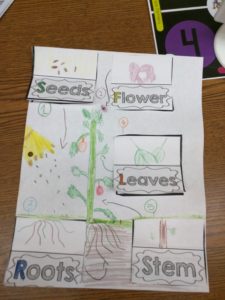
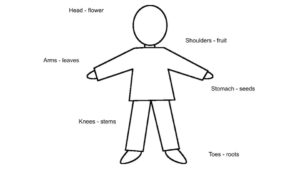
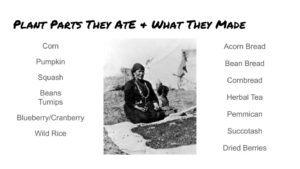
This course requires all students to participate in 20 hours of language and literacy field experiences within a school setting at St. Louis School in a grade 5 classroom. During this time, I was able work one-on-one with students with different reading abilities. Students ranged from a grade 2 reading level up to a grade 6 reading level. The expansion allowed me to see the spread students of the same age range can actually have. It was a good experience and reminder that students (even of the same age) develop at different rates.
This language and literacy practicum gave me the opportunity to practice doing running records with students. Since the teacher had already evaluated the students I worked with, there was no pressure to make sure I did a perfect job on evaluating these students. Furthermore, I was able to take my running records and compare them to the teachers. This was a reassurance in my abilities since I only had two students that I put at a different level than the teacher did.

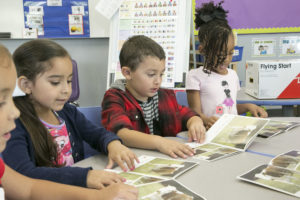
This practicum focuses on inquiry, reflective planning and teaching and assessment practices. I was directly involved in all aspects of teaching for 50% of the required time during the three and a half weeks of the practicum. I was able to complete this practicum in a grade 3 classroom at Vincent Massey School.
Some of my favourite lessons from this practicum …

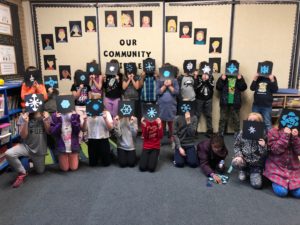

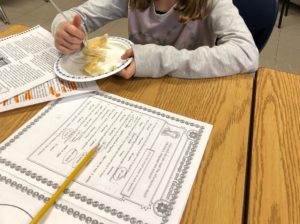
First did Early Practicum Experience involved student teachers in their Practicum II classroom beginning
the first week of school in the fall and throughout the weeks leading up to the start of Practicum II.
Those students wishing to be involved will complete at least 9 days of attendance in their classroom
placement; 5 – 6 of those days will be in the first week of school. The remaining 8 half days will be completed throughout the fall term.
This practicum focuses on professional responsibilities, planning for learning, facilitating learning, assessment, and the classroom environment. Students are expected to be directly involved in all aspects of teaching progressing from 50% and achieving 100% for at least three weeks of the practicum. 12-week practicum (shortened to 7 weeks due to COVID-19). taught 100% for 5 out of the 7 weeks.
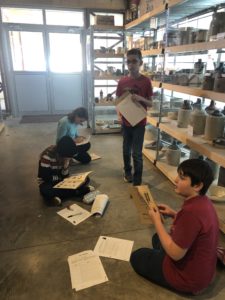
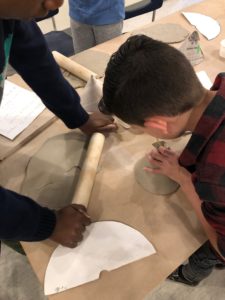
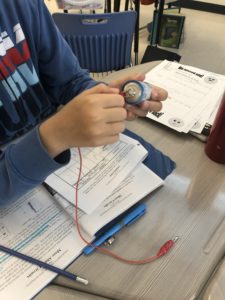
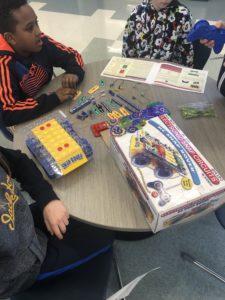
Achievements & Thank You Letters
I have included some of my achievements and reference letters.


